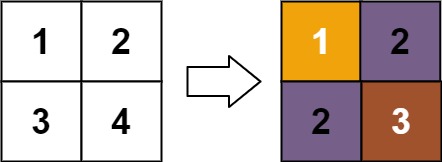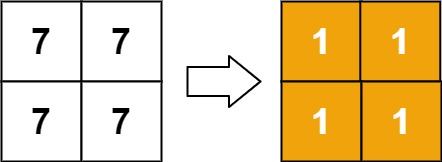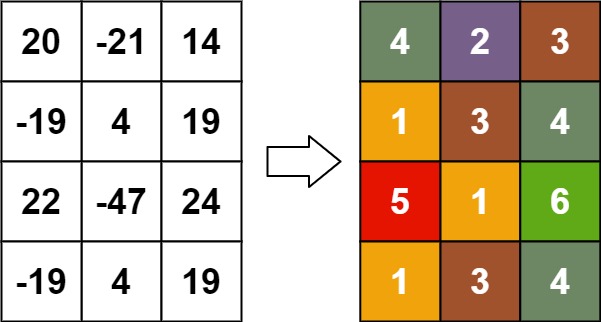Problem
Given an m x n matrix, return **a new matrix *answer* where answer[row][col] is the rank** of **matrix[row][col].
The rank is an integer that represents how large an element is compared to other elements. It is calculated using the following rules:
The rank is an integer starting from
1. If two elementspandqare in the same row or column, then:If
p < qthenrank(p) < rank(q)If
p == qthenrank(p) == rank(q)If
p > qthenrank(p) > rank(q)The rank should be as small as possible.
The test cases are generated so that answer is unique under the given rules.
Example 1:

Input: matrix = [[1,2],[3,4]]
Output: [[1,2],[2,3]]
Explanation:
The rank of matrix[0][0] is 1 because it is the smallest integer in its row and column.
The rank of matrix[0][1] is 2 because matrix[0][1] > matrix[0][0] and matrix[0][0] is rank 1.
The rank of matrix[1][0] is 2 because matrix[1][0] > matrix[0][0] and matrix[0][0] is rank 1.
The rank of matrix[1][1] is 3 because matrix[1][1] > matrix[0][1], matrix[1][1] > matrix[1][0], and both matrix[0][1] and matrix[1][0] are rank 2.
Example 2:

Input: matrix = [[7,7],[7,7]]
Output: [[1,1],[1,1]]
Example 3:

Input: matrix = [[20,-21,14],[-19,4,19],[22,-47,24],[-19,4,19]]
Output: [[4,2,3],[1,3,4],[5,1,6],[1,3,4]]
Constraints:
m == matrix.lengthn == matrix[i].length1 <= m, n <= 500-10^9 <= matrix[row][col] <= 10^9
Solution
class Solution {
public int[][] matrixRankTransform(int[][] matrix) {
int rowCount = matrix.length;
int colCount = matrix[0].length;
long[] nums = new long[rowCount * colCount];
int numsIdx = 0;
int[] rows = new int[rowCount];
int[] cols = new int[colCount];
for (int r = rowCount - 1; r >= 0; r--) {
for (int c = colCount - 1; c >= 0; c--) {
nums[numsIdx++] = ((long) matrix[r][c] << 32) | ((long) r << 16) | c;
}
}
Arrays.sort(nums);
int nIdx = 0;
while (nIdx < numsIdx) {
long num = nums[nIdx] & 0xFFFFFFFF00000000L;
int endIdx = nIdx + 1;
while (endIdx < numsIdx && ((nums[endIdx] & 0xFFFFFFFF00000000L) == num)) {
endIdx++;
}
doGroup(matrix, nums, nIdx, endIdx, rows, cols);
nIdx = endIdx;
}
return matrix;
}
private void doGroup(
int[][] matrix, long[] nums, int startIdx, int endIdx, int[] rows, int[] cols) {
if (startIdx + 1 == endIdx) {
int r = ((int) nums[startIdx] >> 16) & 0xFFFF;
int c = (int) nums[startIdx] & 0xFFFF;
matrix[r][c] = rows[r] = cols[c] = Math.max(rows[r], cols[c]) + 1;
} else {
int rowCount = matrix.length;
int[] ufind = new int[rowCount + matrix[0].length];
Arrays.fill(ufind, -1);
for (int nIdx = startIdx; nIdx < endIdx; nIdx++) {
int r = ((int) nums[nIdx] >> 16) & 0xFFFF;
int c = (int) nums[nIdx] & 0xFFFF;
int pr = getIdx(ufind, r);
int pc = getIdx(ufind, rowCount + c);
if (pr != pc) {
ufind[pr] =
Math.min(
Math.min(ufind[pr], ufind[pc]),
-Math.max(rows[r], cols[c]) - 1);
ufind[pc] = pr;
}
}
for (int nIdx = startIdx; nIdx < endIdx; nIdx++) {
int r = ((int) nums[nIdx] >> 16) & 0xFFFF;
int c = (int) nums[nIdx] & 0xFFFF;
matrix[r][c] = rows[r] = cols[c] = -ufind[getIdx(ufind, r)];
}
}
}
private int getIdx(int[] ufind, int idx) {
if (ufind[idx] < 0) {
return idx;
} else {
ufind[idx] = getIdx(ufind, ufind[idx]);
return ufind[idx];
}
}
}
Explain:
nope.
Complexity:
- Time complexity : O(n).
- Space complexity : O(n).